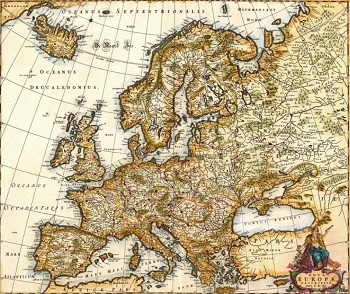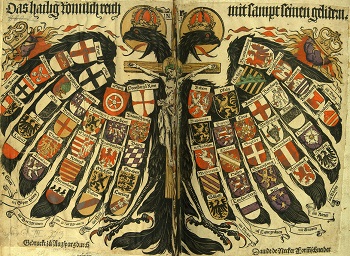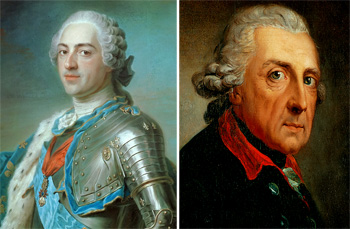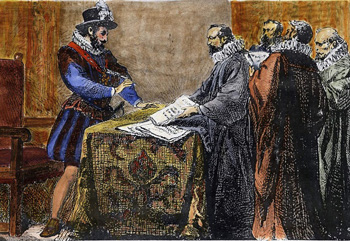Organic Society
 |
 |
 |
 |
 |
 |
 |
The Political-Social Kingdom of Christ
The very concept of Christendom has different breadths of understanding.
One meaning is in regard to the Muslim or barbarian enemies who advanced against the Catholic countries, threatening their existence. In this sense, Christendom was the ensemble of peoples defending themselves, who offered one another mutual assistance both in the defense and in the attack. But essentially it was a defensive attack.
By supporting one another and interacting in this way they formed a society. It was a type of military mutual assistance with sublime ideals. That mutual help lasted as long as the danger remained. And, since the enemies were unrelenting the mutual assistance continued for centuries.

 According to another meaning, Christendom was the ensemble of nations that were ruled by the law of Christ, believed in Jesus Christ, were submissive to the Catholic Church and organized their internal lives according to the maxims of the Gospel. They were all inspired by the same principles, which led them to have the same spirit and mentality, whereby in turn they constituted a family of nations. This did not happen only in the political order, but also in the cultural order. Hence arose the tendency for those various peoples to adopt a single artistic mode, which influenced how they built their monuments, palaces, churches, etc.
According to another meaning, Christendom was the ensemble of nations that were ruled by the law of Christ, believed in Jesus Christ, were submissive to the Catholic Church and organized their internal lives according to the maxims of the Gospel. They were all inspired by the same principles, which led them to have the same spirit and mentality, whereby in turn they constituted a family of nations. This did not happen only in the political order, but also in the cultural order. Hence arose the tendency for those various peoples to adopt a single artistic mode, which influenced how they built their monuments, palaces, churches, etc.
For others – it is shocking that the Catholic spirit could be reduced to something so small – Christendom was just the Holy Roman German Empire and not the ensemble of all Catholic nations on earth.
These concepts were inter-related and a bit fluid. The fact that as it developed it was never defined as we are doing here shows that the concept was being formed gradually in the depths of souls. It was not the object of that type of love that gives birth to the concept. The medieval mentality generated the idea of Christendom like a warm soup that those nations simmered together; then, as the Revolution entered the picture, the soup became cold.
Indeed, the Renaissance ended with the love for Christendom alleging that Christianity did not give us the supreme inspiration of culture and art. It affirmed that this inspiration should instead be sought in Greek-Roman Paganism.
On the other hand, the idea that Christendom could be reduced to only the Holy Roman German Empire also had a bad fruit.
After Protestantism dilacerated Christendom, what remained had a precarious equilibrium and gave up the truth that society had always been influenced by the Catholic Religion. People continued to speak of Christendom but the concept was reduced to refer to a certain agreement of the Christian nations about culture, commerce and economy. The consequence was that the cultural life and economic activity appeared capable of achieving the goals of society without recourse to Religion, which was relegated to a second level.
 There were still some remains of the opposite good sentiment that lived in a confused way alongside this evil sentiment. For example, when the Prussian King Frederick II – who truly was a miniature type of Antichrist – was defeated by Empress Maria Theresa of Austria, he needed a new period of peace to restore his country. For this purpose he sought the support of England.
There were still some remains of the opposite good sentiment that lived in a confused way alongside this evil sentiment. For example, when the Prussian King Frederick II – who truly was a miniature type of Antichrist – was defeated by Empress Maria Theresa of Austria, he needed a new period of peace to restore his country. For this purpose he sought the support of England.
Now then, when England sees an evil cause, it always supports it. This is what happened in this case: England entered and made an alliance with Prussia. The French King Louis XV, seeing Austria abandoned and in danger, deemed it his duty to support Austria. Hence was born the Franco-Austrian Alliance turned against the Protestant English-Prussian league which caused a great joy for Catholics. But these alliances were made not to fight for the reestablishment of Christendom, but for the survival of the respective countries.
The correct thing would have been for France and Austria to have reduced Prussia to nothing and then have opened fire against England.
The coexistence of the Catholic bloc and the Protestant bloc generated an ecumenical lethargic atmosphere. Both sides slept comfortably side by side. It was yet one step more toward the dilution of the idea that Religion should influence the civil order.
What was lacking were fervent souls with torches in their hands rising up against that lethargy. I believe that their absence was a chastisement for Christendom. From this situation comes the mollification of today Catholics that penetrates both the temporal and the spiritual society.
‘The Kingdom of Christ in hearts’
At a certain point in time, Catholics started to be taught that the Kingdom of Christ – Christendom – should only be the Kingdom of Christ in hearts, that is, in the spiritual order. This also implied the social Kingdom of Christ, which would refine even the social order. But social was understood as if the State could be secular, even if society would not be so. They spoke of a “virtually Christian State.” This was already a betrayal.
It was indispensable that “the political-social Kingdom of Our Lord Jesus Christ” should have been proclaimed without fear.
But, unfortunately, those Catholics had neither the idea of a cultural Revolution that would encompass the whole society nor that of a cultural Counter-Revolution, equal and opposed to it. They did not have this idea or at least they did not speak of it. Everything related simply to the social order.
The Kingdom of Our Lord Jesus Christ either includes the whole temporal sphere with its political-social order or is a spoof. However, at that time no one dared to defend this position. When a heresy or a bad custom against Catholic Morals would appear, it would be repressed and that particular evil would be extirpated. But it would be extirpated like a cancer in the body without teaching the good Catholics the whole revolutionary process so that it would not return.
Complicity of the semi-good
What do you do when you do not attack your neighbor who attacks Our Lord Jesus Christ? If you do not attack the evil, you are not really good even if you are Catholic in other points. You are semi-good.
If we would destroy the wall of the semi-good that surrounds evil, the evil would be annihilated.
 The weak point of the psychology of those who are good is that at a certain point in their lives they stop making the effort to fight the evil.
The weak point of the psychology of those who are good is that at a certain point in their lives they stop making the effort to fight the evil.
A medieval lord could believe that there were so many good things around him – beautiful churches, processions, the harmonic life in the city, sound guilds etc – that he could rest. Everything around him looked so strong and stable that he could disregard some sparks of heresy and Revolution here and there. He had a tendency to stop making the effort to fight the evil and to rest.
This resulted in the chronic laziness of the good to combat the evil, and their lack of vigilance to see its importance.
It is difficult to attack the semi-good because the majority of the people believe they are excellent persons.
In the future it would be necessary to make a theory of evil and heresy in such a way that the common man is capable of understanding that evil lives from the concession of the semi-good. This is what must happen in the Reign of Mary.
Posted October 9, 2024


One meaning is in regard to the Muslim or barbarian enemies who advanced against the Catholic countries, threatening their existence. In this sense, Christendom was the ensemble of peoples defending themselves, who offered one another mutual assistance both in the defense and in the attack. But essentially it was a defensive attack.
By supporting one another and interacting in this way they formed a society. It was a type of military mutual assistance with sublime ideals. That mutual help lasted as long as the danger remained. And, since the enemies were unrelenting the mutual assistance continued for centuries.

Above, map of the Medieval Christendom,
below, crest of the Holy Roman German Empire

For others – it is shocking that the Catholic spirit could be reduced to something so small – Christendom was just the Holy Roman German Empire and not the ensemble of all Catholic nations on earth.
These concepts were inter-related and a bit fluid. The fact that as it developed it was never defined as we are doing here shows that the concept was being formed gradually in the depths of souls. It was not the object of that type of love that gives birth to the concept. The medieval mentality generated the idea of Christendom like a warm soup that those nations simmered together; then, as the Revolution entered the picture, the soup became cold.
Indeed, the Renaissance ended with the love for Christendom alleging that Christianity did not give us the supreme inspiration of culture and art. It affirmed that this inspiration should instead be sought in Greek-Roman Paganism.
On the other hand, the idea that Christendom could be reduced to only the Holy Roman German Empire also had a bad fruit.
After Protestantism dilacerated Christendom, what remained had a precarious equilibrium and gave up the truth that society had always been influenced by the Catholic Religion. People continued to speak of Christendom but the concept was reduced to refer to a certain agreement of the Christian nations about culture, commerce and economy. The consequence was that the cultural life and economic activity appeared capable of achieving the goals of society without recourse to Religion, which was relegated to a second level.

Louis XV & Frederick II,
Catholic vs. Protestant
Now then, when England sees an evil cause, it always supports it. This is what happened in this case: England entered and made an alliance with Prussia. The French King Louis XV, seeing Austria abandoned and in danger, deemed it his duty to support Austria. Hence was born the Franco-Austrian Alliance turned against the Protestant English-Prussian league which caused a great joy for Catholics. But these alliances were made not to fight for the reestablishment of Christendom, but for the survival of the respective countries.
The correct thing would have been for France and Austria to have reduced Prussia to nothing and then have opened fire against England.
The coexistence of the Catholic bloc and the Protestant bloc generated an ecumenical lethargic atmosphere. Both sides slept comfortably side by side. It was yet one step more toward the dilution of the idea that Religion should influence the civil order.
What was lacking were fervent souls with torches in their hands rising up against that lethargy. I believe that their absence was a chastisement for Christendom. From this situation comes the mollification of today Catholics that penetrates both the temporal and the spiritual society.
‘The Kingdom of Christ in hearts’
At a certain point in time, Catholics started to be taught that the Kingdom of Christ – Christendom – should only be the Kingdom of Christ in hearts, that is, in the spiritual order. This also implied the social Kingdom of Christ, which would refine even the social order. But social was understood as if the State could be secular, even if society would not be so. They spoke of a “virtually Christian State.” This was already a betrayal.
It was indispensable that “the political-social Kingdom of Our Lord Jesus Christ” should have been proclaimed without fear.
But, unfortunately, those Catholics had neither the idea of a cultural Revolution that would encompass the whole society nor that of a cultural Counter-Revolution, equal and opposed to it. They did not have this idea or at least they did not speak of it. Everything related simply to the social order.
The Kingdom of Our Lord Jesus Christ either includes the whole temporal sphere with its political-social order or is a spoof. However, at that time no one dared to defend this position. When a heresy or a bad custom against Catholic Morals would appear, it would be repressed and that particular evil would be extirpated. But it would be extirpated like a cancer in the body without teaching the good Catholics the whole revolutionary process so that it would not return.
Complicity of the semi-good
What do you do when you do not attack your neighbor who attacks Our Lord Jesus Christ? If you do not attack the evil, you are not really good even if you are Catholic in other points. You are semi-good.
If we would destroy the wall of the semi-good that surrounds evil, the evil would be annihilated.

King Henry IV signing the Edict of Nantes giving rights to Protestants in a Catholic France
A medieval lord could believe that there were so many good things around him – beautiful churches, processions, the harmonic life in the city, sound guilds etc – that he could rest. Everything around him looked so strong and stable that he could disregard some sparks of heresy and Revolution here and there. He had a tendency to stop making the effort to fight the evil and to rest.
This resulted in the chronic laziness of the good to combat the evil, and their lack of vigilance to see its importance.
It is difficult to attack the semi-good because the majority of the people believe they are excellent persons.
In the future it would be necessary to make a theory of evil and heresy in such a way that the common man is capable of understanding that evil lives from the concession of the semi-good. This is what must happen in the Reign of Mary.
Posted October 9, 2024

Organic Society was a theme dear to the late Prof. Plinio Corrêa de Oliveira. He addressed this topic on countless occasions during his life - at times in lectures for the formation of his disciples, at times in meetings with friends who gathered to study the social aspects and history of Christendom, at times just in passing.
Prof. Plinio
Atila S. Guimarães selected excerpts of these lectures and conversations from the transcripts of tapes and his own personal notes. He translated and adapted them into articles for the TIA website. In these texts fidelity to the original ideas and words is kept as much as possible.
______________________
______________________






